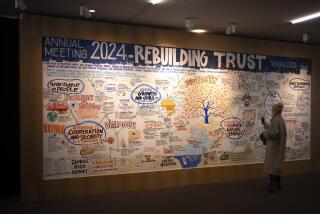True Believers at the World Bank
A few decades after the end of the war that he managed, former Defense Secretary Robert McNamara told us that the Vietnam War had been a mistake and he apologized.
Great. But when, I’d like to know, is he going to apologize for the World Bank?
In the late 1960s, you may remember, McNamara left the Defense Department and -- with what looked like relief -- went to run the World Bank. After masterminding the most ill-conceived U.S. war (till recent times), he may have seen an opportunity to redeem himself. In the years that followed, he apparently became so involved in the bank’s poverty-fighting mission that he actually cried on a couple of occasions when he delivered the annual report.
But good intentions aren’t everything, and, unfortunately, McNamara brought his penchant for ideologically driven strategies with him.
Before his presidency, the World Bank typically made loans to Third World governments to support transportation, irrigation, education and other basics that were meant to promote economic development. But there was a lot of corruption. For that and other reasons, the loans didn’t always accomplish all that was hoped for.
In the McNamara era, the bank began to make loans on the condition that nations privatize public services and allow foreign money to move in and out of the country with little regulation. The idea was to create a climate in which private investment would lift people out of poverty. For the next 30 years, the World Bank and the International Monetary Fund followed this market-oriented strategy, which came to be known as “the Washington Consensus.”
Before the McNamara years, the poorest people didn’t get much richer. But during the Washington Consensus years, they got poorer and poorer.
I saw how that could be possible when I became a shareholder in the French water company Suez, which took over the water system of Johannesburg, South Africa.
To get ready for privatization, South African communities followed the World Bank/IMF suggestion that water rates be raised so consumers would get used to paying the full cost. The water of many people was cut off when they couldn’t pay their bills. In some places they started taking water from rivers. The result was a cholera epidemic.
Cholera is an extreme result for a development scheme. But then, privatizing water in Africa is an extreme application of the World Bank’s private investment theory. After all, a private company has to have some way of making money.
How is a private water company supposed to recoup the expense of extending pipelines to people who are simply too poor to pay the real cost? If you buy a Third World water company, it’s far easier, you’ll quickly discover, to recoup the investment by siphoning the water out to be bottled and consumed elsewhere.
Even in the First World, it’s often more profitable to siphon off than to “develop.” For a few years, the Suez Co. also owned the water system in Bergen County, N.J. During its stewardship, it sold off land around the reservoir to private builders. Then it turned around and sold the whole water system to another company. We shareholders took the money and ran. Technically that’s called “asset stripping.” And it’s perfectly legal.
A quarter of a century of day-in, day-out asset stripping sponsored by the IMF and the World Bank left millions of poor people poorer. Meanwhile, the unregulated capital flows -- another tenet of the Washington Consensus -- led to speculative booms and currency crashes that pushed hundreds of millions of people down into dollar-a-day poverty.
But the true believers were unswayed. They knew that private investment must eventually lead to poverty reduction, so they soldiered on.
Finally, a few pragmatists, such as the World Bank’s chief economist, Joseph Stiglitz, had the courage to say, “Hey guys, this should be working, but it’s not.” After Stiglitz spoke out publicly, his resignation was requested and quickly accepted.
But the ideological walls were weakening. Painful as it was, many development economists began to lose faith in a theory that was so often contradicted by the facts. Then, just as the doyens of development were becoming less dogmatic, George W. Bush got the chance to choose a new president for the World Bank. On Wednesday, his choice, Paul Wolfowitz, makes the move McNamara did -- from the Pentagon to the World Bank.
I saw Wolfowitz asked on television about his qualifications for the job. He answered by expressing a commitment to poverty reduction that sounded sincere. He went on, unasked, to say that the most important way to fight poverty -- more important, he stressed, than assistance or even access to trade -- is “creating an atmosphere in which private investment ... is encouraged.” In that, alas, he sounded even more sincere.
Unlike McNamara, Wolfowitz hasn’t apologized for his war yet, and maybe he’ll never have to. OK, so they didn’t welcome us with flowers. OK, we couldn’t pay for it with Iraqi oil. Yes, it cost a little more in lives, money and honor than he expected. Still, the Middle East may yet change in directions that he favors. So Wolfowitz may never feel a need to question his military doctrine. But if, as president of the World Bank, he sticks as rigidly to his economic dogma, he’ll owe the whole world an apology for even more suffering and death.
More to Read
Sign up for Essential California
The most important California stories and recommendations in your inbox every morning.
You may occasionally receive promotional content from the Los Angeles Times.










